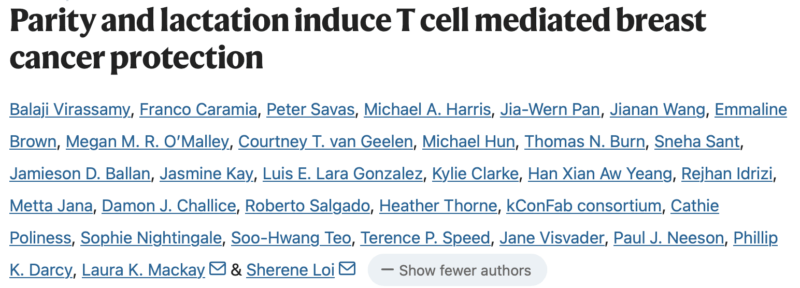Olubukola Ayodele, Breast Cancer Lead at University Hospitals of Leicester NHS Trust, shared a post on LinkedIn:
“Re-thinking Prevention in Breast Cancer
As a breast oncologist and community educator, I often talk about the known risk factors for breast cancer, such as late first pregnancy, not breastfeeding, family history, and so on. But for years, we’ve understood these links without really knowing why.
Now, a new study from Sherene Loi and her brilliant team at the Peter MacCallum Cancer Centre in Australia has given us a biological explanation that could change how we think about prevention.
Presented at ESMO25 and published in Nature, the study shows that pregnancy and breastfeeding help the body build long-lived CD8+ T-cells, immune cells that ‘remember’ and protect the breast against future cancers, especially the more aggressive triple-negative breast cancer (TNBC).
In both human samples and mouse models, the team found that this protective effect depended on completing the full cycle of pregnancy, breastfeeding, and involution. In over 1,000 patient samples, TNBCs from women who had given birth showed higher immune activity and better outcomes.
For decades, large studies have hinted at this link:
- Women who breastfed for ≥25 months had a 27% lower risk of breast cancer.
- In the Nurses’ Health Study, breastfeeding lowered the risk of ER-disease (HR 0.82).
- Among African-American women, those who breastfed had a significantly lower TNBC risk.
- In younger women (<50 yrs), not breastfeeding doubled the risk of TNBC.
Now we finally have a mechanism that connects these dots.
Why this matters
This research reframes immunity from something we ‘treat with’ to something we might ‘prevent through’. It’s a powerful reminder that biology and behavior work hand-in-hand and that supporting breastfeeding is not just a lifestyle issue, but a public health and equity issue.
For practice and policy
We need to:
- Support women who choose to breastfeed through workplace flexibility, cultural understanding, and practical help.
- Ensure messaging around breastfeeding empowers, not pressures.
- Recognise that TNBC disproportionately affects younger and Black women and that equitable access to support is part of cancer prevention.
Final thoughts
This research turns a long-observed epidemiological signal into actionable biology. It also reminds us that prevention in breast cancer must engage both behavioral and biological levers and must be anchored in equity.
As someone committed to improving outcomes and equity in breast cancer care, this reinforces that we must support women across reproductive life, consider immune-biology in prevention, and ensure that the protective benefits of breastfeeding are available and supported for all women.”
Title: Parity and lactation induce T cell mediated breast cancer protection
Authors: Balaji Virassamy, Franco Caramia, Peter Savas, Michael A. Harris, Jia-Wern Pan, Jianan Wang, Emmaline Brown, Megan M. R. O’Malley, Courtney T. van Geelen, Michael Hun, Thomas N. Burn, Sneha Sant, Jamieson D. Ballan, Jasmine Kay, Luis E. Lara Gonzalez, Kylie Clarke, Han Xian Aw Yeang, Rejhan Idrizi, Metta Jana, Damon J. Challice, Roberto Salgado, Heather Thorne, Cathie Poliness, Sophie Nightingale, Soo-Hwang Teo, Terence P. Speed, Jane Visvader, Paul J. Neeson, Phillip K. Darcy, Laura K. Mackay, Sherene Loi
Read the Full Article in Nature.

More posts featuring Olubukola Ayodele on OncoDaily.


